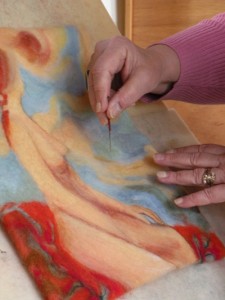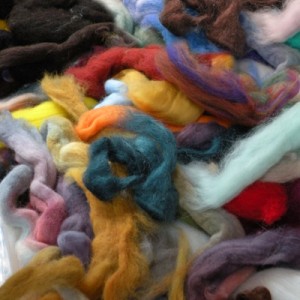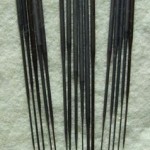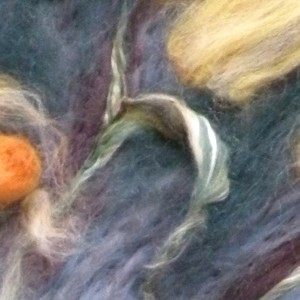 Creating a Needle Felted Painting is of course a personal experience, and different for everyone. I take tiny tufts of hand dyed raw wool, and use a repetitive motion of driving the tuft with a felting needle through itself to attach to a wool canvas….taking advantage of the natural microscopic hooks that the wool itself contains.
Creating a Needle Felted Painting is of course a personal experience, and different for everyone. I take tiny tufts of hand dyed raw wool, and use a repetitive motion of driving the tuft with a felting needle through itself to attach to a wool canvas….taking advantage of the natural microscopic hooks that the wool itself contains.
I bring the elements of all my years experience as an artist with various mediums and my passion for watercolor painting, and the personality of wool to create what feels like the spirit of painting.
 Layer after layer after layer, I build a blend of colors and shapes lines and textures, following a vision that I had or one that is emerging. Sometimes I keep adding, sometimes taking away, rearranging, a journey of ever changing exploration… unlike watercolor painting which is hard to successfully rework…. until it looks and feels like the vision I had or one that evolved that I like.
Layer after layer after layer, I build a blend of colors and shapes lines and textures, following a vision that I had or one that is emerging. Sometimes I keep adding, sometimes taking away, rearranging, a journey of ever changing exploration… unlike watercolor painting which is hard to successfully rework…. until it looks and feels like the vision I had or one that evolved that I like.
The felting needle was invented for industrial use; to enhance and expand the felting process so that synthetic and plant fibers could be felted. In the early 1980’s David and Eleanor Stanwood used a barbed needle from an industrial felting factory to develop needle felting as a handcraft. Needle felting has progressively gained popularity amongst handcrafters, doll makers, bear artists, and artisans.
Felting needles are made from carbon steel and are about 3 inches long. The L-shaped hook fits into the industrial equipment and is the end we hold; the sharp point at the other end facilitates penetration. The “working zone” is typically triangular in cross section, having three edges with a series of barbs cut into one or more of these edges. These barbs catch and move the fibers as the needle is repeatedly jabbed into the fiber mass.
As a long time artist I find myself mesmerized by the flow of colour, texture, depth and flexibility in the medium of Needle Felting. I hope you enjoy my latest creative expressions.


